- Home
- Warhammer 40K
Grandfather’s Gift - Guy Haley
Grandfather’s Gift - Guy Haley Read online
Contents
Cover
Grandfather’s Gift – Guy Haley
About the Author
A Black Library Publication
eBook license
Grandfather’s Gift
Guy Haley
There once was a being who was divided by himself. Opposed in all he was, contrary, and doomed.
This being was man who was not a man. He was a sorcerer who despised magic. He was a saviour who had turned to damnation. He was a treasured son who hated his fathers.
He forgot all this, for a while, and when he awoke upon the slimy moss, he recalled nothing of his life. For a few, blissful minutes he was without past or prejudice, and knew a measure of peace.
It could not last. A part of his hypocrisy was a desire for knowledge, although he had once judged a brother for seeking the same. His mind set to work assessing its shroud of flesh. He was a he, he knew that instinctively. The first piece of the puzzle in place, his sense of peace began an inexorable retreat.
He was made in the form of a human male, with the bilateral symmetry of a Terran organism, and the feet and hands of a post-simian being. He was not a man. Men were small and weak, but he was strong, improved upon – man made god. His human form caged immortal power. Once he remembered that, he realised he had always known what he was, better than his brothers did.
He had brothers. Peace fled further. Bitterness filled its void.
He sat upright. Strong hands pushed into the lawn. Filthy water welled from the giving surface. He looked around, perplexed, at black trees reaching out coy branches from the mist. Marsh gas filled his nostrils with its fulsome scent, and that stirred another memory. His hand went to his throat and his face, seeking out the apparatus that should cover his mouth, the gas exchange and vaporator that filled his lungs with the airs of his youth. Finding their lack, a memory of fog-choked mountains rushed back, and with it, rolling onto his tongue sure as a marble down a tube, was a name. His name.
‘Mortarion,’ he said. ‘I am Mortarion.’
He got to his feet and scanned the miserable trees that fringed the lawn. Nothing moved among them but curls of vapour dancing at the decree of gentle currents.
Mortarion looked down at himself. Tall, wan yet powerful, spare of limb and gauntly featured, there was iron strength in the sinews of his frame. Long, lank hair brushed his cheeks. He wore loose clothes of grey, a tunic and trousers, covered with a robe. He never dressed like this. He knew that too. Of his gas mixer and his pistol, the Lantern, the Barbaran plate that armoured him and his scythe, Silence, there was no sign. None of the panoply of war he bore everywhere was to be seen. He looked about again, expecting, perhaps, for his armament to be heaped up at the foot of a tree for him to take up. It was not.
A further peculiarity struck him. The form he wore, though it once was his, was his no longer. There had been… alterations. The genetic masterwork of his second father had been perfected by further gifts. Gifts from a true divinity, not the false god his first father was, inured him to all pain and harm. He had been remade into a lord of death. And yet here he was, as untouched as the day his second father had come to find him. He remembered light and disappointment, and a hatred that curdled his soul. Or was all that just a dream?
He could not tell. He did not know. He was as he had been long ago, or not so long ago. He had changed, he had not changed. Both statements appeared to be true.
‘Barbarus?’ he said aloud, his whisper stirring clotted air. No, it was not Barbarus. The idea struck him as ridiculous as soon as he spoke. Barbarus was gone. He had a new home.
Dim recollections pressed at him. His laboratory, high in the mists of another world akin to Barbarus, but so much worse. Experiments with arcane technology. The fruits of his triumph over base sorcery. Technology he was determined to perfect. The technology was not the end. There was a purpose to it… There was something he was seeking, something he had wanted for years. He grimaced in frustration. What he sought, he could not recall.
His head was empty of knowledge, so, like the scientist he was, he fell back on observation, the first tool of rational investigation.
The lawn was of emerald-green moss, so deep his bare feet sank up to the ankles and soaked the cuffs of his trousers. The black trees ringed it; a predatory plantation. He spied a path of broken stone leading from the lawn and, on a whim, followed it.
He emerged into a wide space. It was square, deliberately planned, he thought, for it was divided into beds of fibrous mulch separated by paths. Crops of fungus sprouted with such unrestrained variety they could only be cultivars. There, all sign of a guiding hand ended. Neglect took away the arrangement’s beauty.
The paths between were overgrown. The hedge had gone wild, its rotting boughs brushing the ground. The ornament at the centre was so shrouded in dead growth that its shape was indiscernible.
‘A garden,’ he said. He closed his eyes and breathed deeply of the moist atmosphere. ‘A garden perfumed with subtle decays and rots.’
It was a garden to his liking. It reminded him of home.
He decided to tarry a while, and began to explore.
Mortarion walked trails overhung with drapes of dripping mosses. They swept the ground like beards, the trees they trailed from stooped and gnarled like old men. Fat flies droned a soporific, buzzing music from blackened flower to blackened flower, harvesting no pollen but depositing a generosity of blight with each heavy landing. Ponds scummed with algae and thick ropes of stinking weed eructed poison gases. Rotting heads hung as fruits in an orchard of trees, whose bark was soft and white as the skin of drowned men. Untended vegetable patches sprouted diseased hands that swatted feebly at the flies devouring them. Gurgling brooks of filth wound their way between meadows of sopping black reeds. Things croaked and twittered in the margins. Little fat creatures stared at him with glowing eyes and tittered with undisguised malevolence. Flapping black birds whose bodies dribbled noxious liquid filled ornamental crags with their squawking.
Mortarion wandered the greenswards, woods and marsh of this garden. He took no particular route, meandering aimlessly. A motionless, sickly green sun burned behind the fogs, its orb bloated by diffraction and warm as a night fever. Time was runny, thick as phlegm for a while, sometimes dissolving into quick seconds fluid as thin plasmas. Years could have stolen by.
Not once did Mortarion tread the same path twice. Not once did he witness the same sight. He found much to amaze him.
All the while his body was under attack, though he was not concerned. His body was inured to disease. Phage and spore sought to take root in his skin. His nose tickled with the repeated inquiries of viruses. Yet nothing could mortify his perfect flesh, and he remained free of morbidity while everything else ran thick with infection and decay. Acidic dews rotted through the cloth of his suit, making it tear and fall apart upon him. Soon he was nearly naked, and smirched head to foot with foetid matter. But in that garden he felt no shame. He belonged there. Though the peace of his awakening had gone, and the gnawing bitterness that was his constant companion had returned, Mortarion was calm. The sweaty warmth of the sun was delightful. He marvelled at the profusion of growth. He recalled another life, another time in service of his second father, who would deny all this rot and renewal. With the revelation of such splendid, fecund decay he wondered how he could ever have believed in a stable universe. The myth of man’s supremacy was laughable in the face of entropy, and so he did laugh, long and hard.
Weeping from afar interrupted his mirth.
His laughter faltered. Mortarion had long since hardened his hea
rts against misery. He revelled in his woes, and though his own bleak stoicism was affectation, he had come to find those who suffered contemptible. Misery was the natural state of man. It should not be denied, and certainly could not be washed away with tears. Such was the despair in the cries from the mist that it touched upon a part of him long since scabbed over. A human empathy. A human need. An understanding of, and care for, the pain of others. He remembered village women mourning their stolen children. He remembered misty valleys. He remembered the urge to fight to stop that crying.
Before he had time to think, he was heading through a moist thicket and down a hill. Brittle shrubs gave way to open ground, and a hollow in the land opened in front of him. It had contained some sort of folly, or perhaps a fane, but the stones were scattered and crushed into the surrounding mud and the ground churned up so thoroughly that the hollow’s bottom had become a wallow filling with creeping, soil-dark water.
In this modest bath sat an enormous being. A huge thing, a giant, stout as a trencherman whose greed had fattened its limbs to pillows and its stomach to a mattress, and whose head was as square and as squat as a cushion sinking gracelessly into shabby old furniture. Its skin was riven with cracks, plagued with sores, troubled with mites and wounds and dribbling rashes. Upon the chest the skin had decayed entirely, displaying greying muscle beneath. A great hole opened into the being’s chest cavity, where in the caves of its ribs little beings played and fought over scraps of rancid flesh, miniature versions of the giant they parasitised.
A daemon, Mortarion thought. A daemon of Nurgle. Neither the word daemon nor the name Nurgle perturbed him. The plague god was his master, he remembered, embraced in a moment of desperation. That caused him no trouble either. It simply was.
This daemon was different. Mortarion had treated with these things, he had fought them, he had allied with them. They were capricious but jovial, laughing as they slew, chortling as they released their pathogens, and joyous all the more as mortal flesh blackened and ran. Not this one. This one sat with its face buried in pudgy hands so that its features were hidden and its horns hung miserably low.
The daemon was so immense its head came level with the lip of the hollow. It was powerful enough to do harm to Mortarion should it desire. He had never seen a daemon weep that way, and his curiosity overcame his caution.
‘O Daemon,’ he said, speaking the o, for together with d, a, e, m, o and n it made seven letters, and in seven there was power. ‘Why do you cry?’
The monster started. Not having heard Mortarion approach, the daemon was embarrassed to have its sorrow witnessed and endeavoured to hide it, flicking away tears of pus, clearing its throat and blinking rheumy eyes to clear them.
‘You have not heard of the woe of Khu’gath?’ it mumbled.
‘Khu’gath? I think I know that name.’
The creature cleared its nose into its hand with a long, foghorn blast, then pawed the resulting effluvia away onto its leathery hide. It wiped its runny eyes upon blubbery forearms and nodded earnestly.
‘Yes, Lord Mortarion. You and I have fought together many times. We are allies you and I.’
‘I do not recall,’ said Mortarion.
Khu’gath shifted its bulk and the ground quaked. The daemon moved its giant head towards Mortarion. Its rotting septum quivered as it sniffed. ‘Ah!’ it said, realisation overcoming its misery. ‘That is because it is yet to happen. It will though, oh, it will. Time means nothing here.’
That made a sort of sense to Mortarion. Beneath his forgetfulness he knew these things as well as he knew the parts of himself. ‘I see. In that case, we are friends.’
‘As much as we can be,’ agreed the daemon.
‘Then tell me, why do you weep, Khu’gath?’
Khu’gath folded its hands in its lap and stared at them. ‘Our master’s boon is the cessation of suffering. Fatalists, pessimists, realists, all who acknowledge the inevitability of woe will cease to be troubled by it should they embrace our grandfather. Our master brings joy. He releases us from sorrow.’
‘Yet you are not free of woe.’
‘True, true, all too true!’ Reminded of its misery, Khu’gath resumed its weeping
‘But why?’ said Mortarion.
Again Khu’gath swallowed back its sorrow. ‘The manner of my creation. Our lord was working in his manse,’ it waved one flabby paw vaguely towards the east, ‘creating the greatest plague that would ever be known. It was never released. I was a mite, a nurgling, a thing no bigger than your hand span. I fell within his cauldron and drank it dry. So potent was the brew that I swelled and swelled, becoming as you see me here.’
‘So our lord hates you?’
‘No, no, no!’ said Khu’gath forcefully, angered at this slight against their god. ‘Far from it. He loves me, and that makes it so much worse!’ It began to weep again.
‘I, too, brought sorrow on my father, but I am glad of it, for I hate Him.’
‘Then you are luckier than I. You have purpose, and though you have no father now, you have a loving grandfather. Who does not know of the great Mortarion! How the garden filled with joy when you turned to our lord.’ Khu’gath licked its wide lips with a scabrous tongue. ‘Tell me then, favoured one. How come you are here? Why are you not abroad doing the good work of Papa Nurgle?’
‘I am not here. I am in my laboratory,’ said Mortarion, and as he spoke the words more recollection came to him. ‘I was engaged upon a search for something.’ He frowned. ‘Yet I cannot recall what. My machines overloaded. I woke to find myself here. It is strange. I did not think I could dream any more.’
Khu’gath clapped its hands delightedly.
‘You do not dream! You trifle with magic. You walk abroad in the realms of the soul. This form you wear here, it is your essence. You pass from the realms of flesh to the Realm of Chaos. You are a sorcerer.’
‘It is not magic. It is science,’ said Mortarion dangerously. ‘I remain innocent of sorcery. My service is performed with utmost rationality. I am in my laboratory.’
‘Are you now?’ said Khu’gath.
‘I am.’
‘In the place they call the Plague Planet?’
‘Yes,’ said Mortarion.
‘A planet reformed by your will.’
‘A planet reformed by my efforts.’
‘I disagree. Did you use machinery or slaves? Did you dig and pile, did you cultivate and plant?’
‘No,’ said Mortarion. ‘I employed the sacred arts of numerology, for in sympathetic mathematical calculation the forms of things may be changed.’
‘That sounds like magic,’ said Khu’gath.
‘It is not,’ said Mortarion.
Khu’gath shrugged. ‘As you will. What of this place?’
Mortarion looked around. ‘It is a projection of my mind, nothing more. The full nature of Grandfather Nurgle is unknowable. This garden is too mundane to encapsulate his being. The garden is a metaphor, the attempt by a limited mind to comprehend the ineffable.’
‘So you created it then?’
‘If it were real I could not create it. But it is not real, so in a sense I did.’
‘I am real. The garden is real. If you made it, that would be magic. You are a sorcerer,’ pronounced Khu’gath with certainty.
‘I am a manipulator of the warp through the application of numerological truths.’
‘Magic, magic, magic!’ said Khu’gath.
‘I will not argue with a dream,’ said Mortarion.
‘This is no dream, my friend. Tell me, do you remember your purpose here?’
‘I do not. I admit.’
‘I will tell you then, for Grandfather knows, and all Grandfather knows, I know. You are looking for your father. Your first father. The sorcerer who enslaved you.’
‘I am,’ said Mortarion, with sudden clarity.
Khu’gath clapped its hands and rubbed them together. With astonishing speed, it snatched Mortarion up and squeezed and moulded his flesh. It hummed as it garlanded the primarch with change. Mortarion was too startled to reply, and could not, anyhow. His wind was kneaded from his lungs and passed over his vocal cords in an accordion wheeze. His bones cracked, his flesh ran. His well-made face was soothed and prodded and sculpted into features new. It was agony. Mortarion was stoic about his suffering. Life was suffering.
When Khu’gath was done, it set Mortarion down upon the brink of the hollow. He was taller, stronger, garbed in his armour and carrying his weaponry. His blood burned with painful energies, and upon a twisted, disease-ravaged face was clamped a breathing mask that filled his lungs with pleasingly toxic vapours.
‘This has been done to me before,’ he said, his voice hollow behind his mask. ‘This is how I am. You did not do this to me.’
‘Maybe I did do it to you,’ said Khu’gath. ‘Maybe it has not been done until now, and this is the first time. Maybe it is the second time. Maybe this is all a memory. Maybe it is the first and second time, or you are a different Mortarion on a different path to the one you remember. All things are true in this realm. You stand in the nexuses of realities, the Realm of Chaos. In this place, all possibilities are true, and all truths are possible.’
‘The warp,’ said Mortarion. ‘I cannot survive there. Can I?’ Another memory intruded. He could survive, he realised. He had.
Khu’gath sniggered wetly. ‘If you like. It is the warp, and it is not.’ It leaned back to admire its handiwork. It frowned. ‘We’re missing something.’ It turned Mortarion around and slapped him hard upon his back, dug its nails in and yanked back. Mortarion cried out as a broad set of wings burst from his flesh and unfurled.
‘There. That is as it should be. Now fly, young Mortarion, and catch the quarry you seek. He is here, in this garden. Grandfather Nurgle has given him to you. It is a gift for your devotion.’

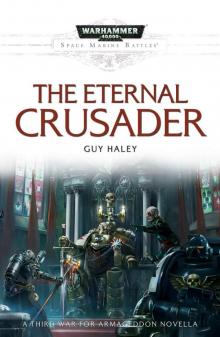 The Eternal Crusader - Guy Haley
The Eternal Crusader - Guy Haley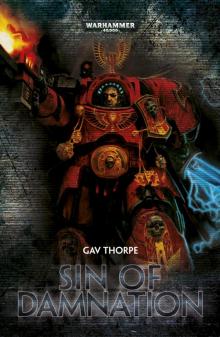 Sin of Damnation - Gav Thorpe
Sin of Damnation - Gav Thorpe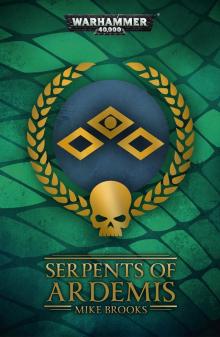 Serpents of Ardemis - Mike Brooks
Serpents of Ardemis - Mike Brooks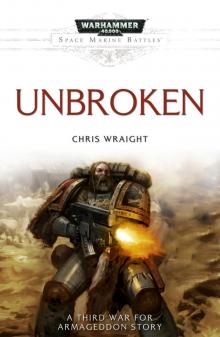 Unbroken - Chris Wraight
Unbroken - Chris Wraight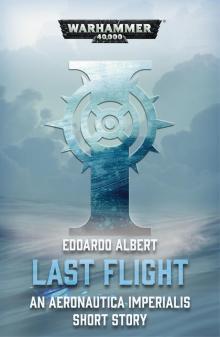 Last Flight - Edoardo Albert
Last Flight - Edoardo Albert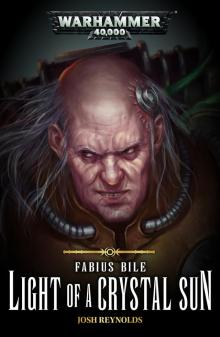 Light of a Crystal Sun - Josh Reynolds
Light of a Crystal Sun - Josh Reynolds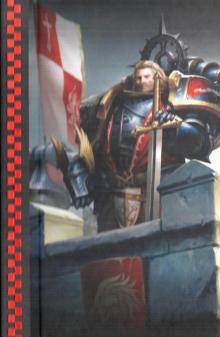 Lion El'Jonson- Lord of the First - David Guymer
Lion El'Jonson- Lord of the First - David Guymer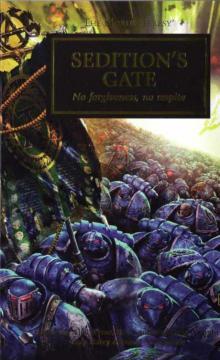 Sedition's Gate - Nick Kyme & Chris Wraight
Sedition's Gate - Nick Kyme & Chris Wraight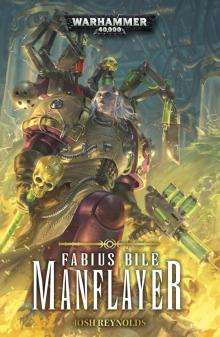 Manflayer - Josh Reynolds
Manflayer - Josh Reynolds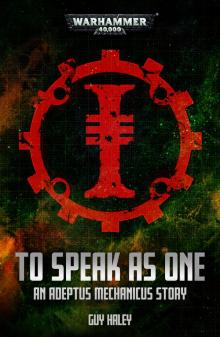 To Speak as One - Guy Haley
To Speak as One - Guy Haley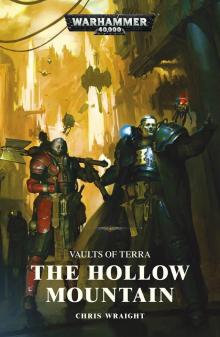 Vaults of Terra- The Hollow Mountain - Chris Wraight
Vaults of Terra- The Hollow Mountain - Chris Wraight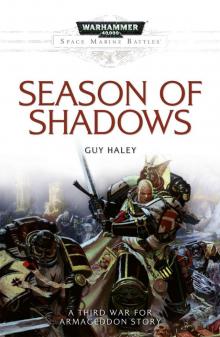 Season of Shadows - Guy Haley
Season of Shadows - Guy Haley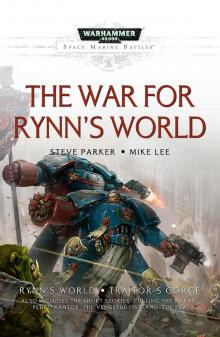 The War for Rynn's World - Steve Parker & Mike Lee
The War for Rynn's World - Steve Parker & Mike Lee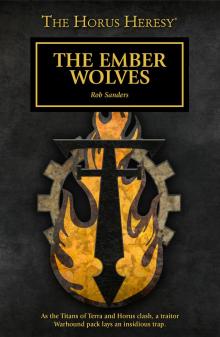 The Ember Wolves - Rob Sanders
The Ember Wolves - Rob Sanders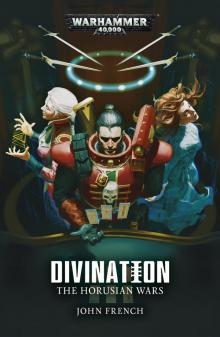 Divination - John French
Divination - John French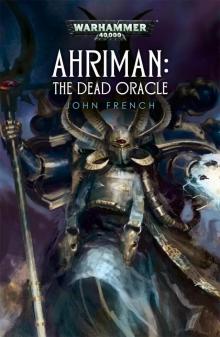 The Dead Oracle - John French
The Dead Oracle - John French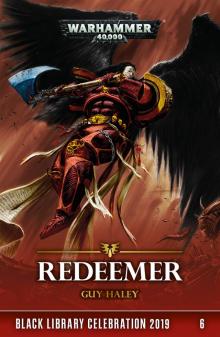 Redeemer - Guy Haley
Redeemer - Guy Haley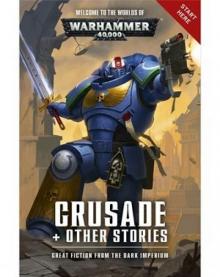 Crusade & Other Stories - Dan Abnett Et Al.
Crusade & Other Stories - Dan Abnett Et Al.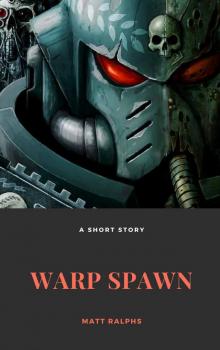 Warp Spawn - Matt Ralphs
Warp Spawn - Matt Ralphs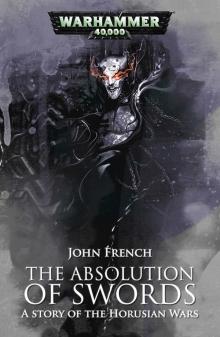 The Absolution of Swords - John French
The Absolution of Swords - John French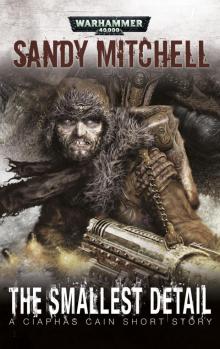 The Smallest Detail - Sandy Mitchell
The Smallest Detail - Sandy Mitchell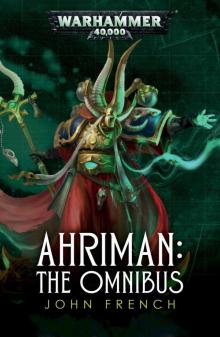 The Omnibus - John French
The Omnibus - John French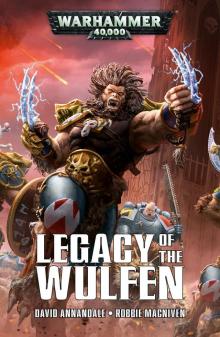 Legacy of the Wulfen - David Annandale & Robbie MacNiven
Legacy of the Wulfen - David Annandale & Robbie MacNiven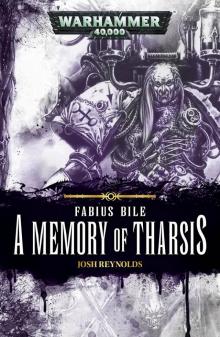 A Memory of Tharsis - Josh Reynolds
A Memory of Tharsis - Josh Reynolds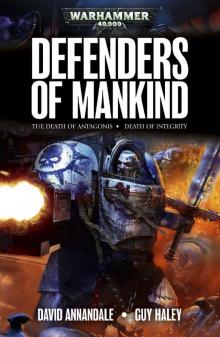 Defenders of Mankind - David Annandale & Guy Haley
Defenders of Mankind - David Annandale & Guy Haley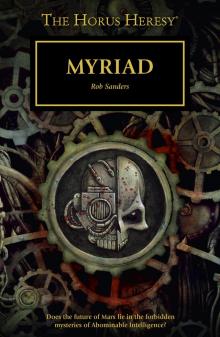 Myriad - Rob Sanders
Myriad - Rob Sanders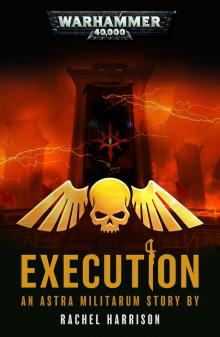 Execution - Rachel Harrison
Execution - Rachel Harrison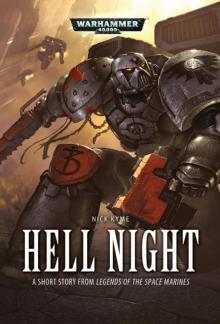 Hell Night - Nick Kyme
Hell Night - Nick Kyme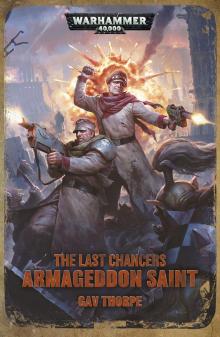 Armageddon Saint - Gav Thorpe
Armageddon Saint - Gav Thorpe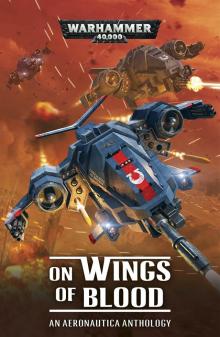 On Wings of Blood
On Wings of Blood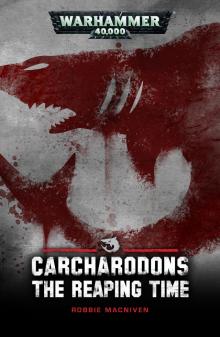 The Reaping Time - Robbie MacNiven
The Reaping Time - Robbie MacNiven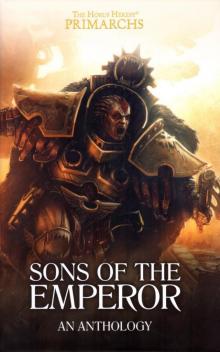 Sons of the Emperor
Sons of the Emperor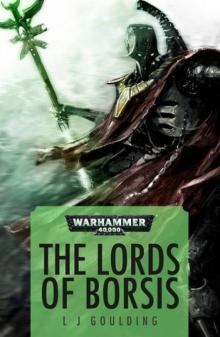 The Lords of Borsis - L J Goulding
The Lords of Borsis - L J Goulding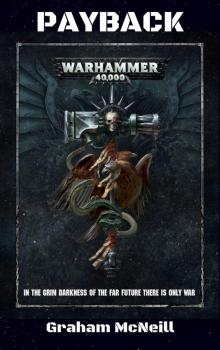 Payback - Graham McNeill
Payback - Graham McNeill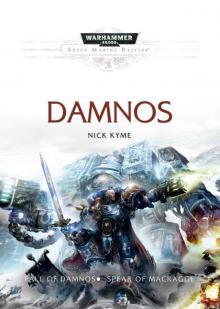 Damnos - Nick Kyme
Damnos - Nick Kyme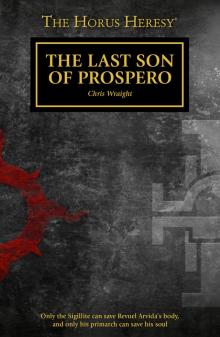 The Last Son of Prospero - Chris Wraight
The Last Son of Prospero - Chris Wraight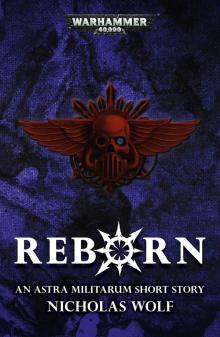 Reborn - Nicholas Wolf
Reborn - Nicholas Wolf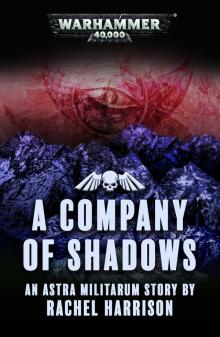 A Company of Shadows - Rachel Harrison
A Company of Shadows - Rachel Harrison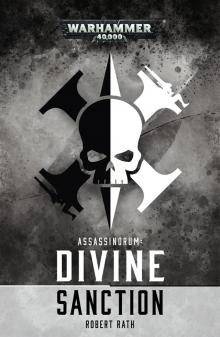 Assassinorum- Divine Sanction - Robert Rath
Assassinorum- Divine Sanction - Robert Rath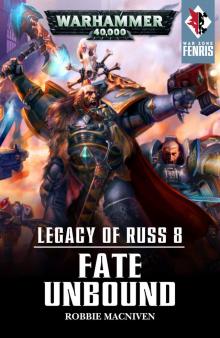 Fate Unbound - Robbie MacNiven
Fate Unbound - Robbie MacNiven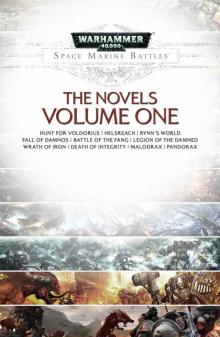 Space Marine Battles - the Novels Volume 1
Space Marine Battles - the Novels Volume 1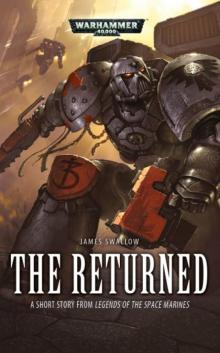 The Returned - James Swallow
The Returned - James Swallow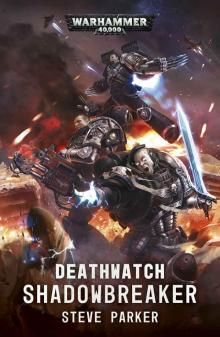 Shadowbreaker - Steve Parker
Shadowbreaker - Steve Parker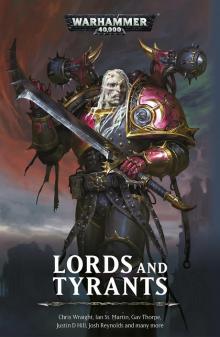 Lords and Tyrants
Lords and Tyrants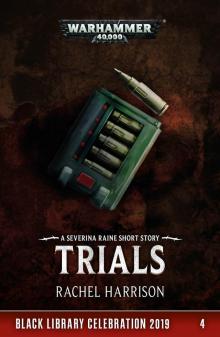 Trials - Rachel Harrison
Trials - Rachel Harrison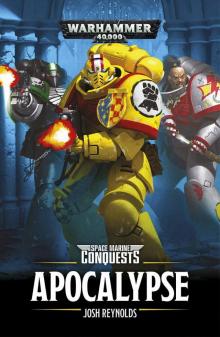 Apocalypse - Josh Reynolds
Apocalypse - Josh Reynolds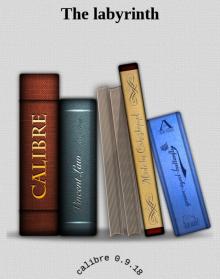 The labyrinth - Richard Ford
The labyrinth - Richard Ford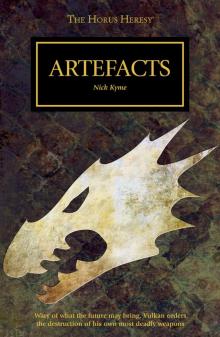 Artefacts - Nick Kyme
Artefacts - Nick Kyme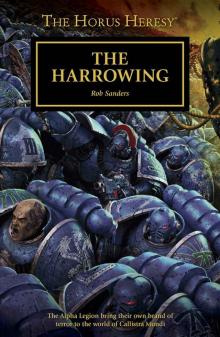 The Harrowing - Rob Sanders
The Harrowing - Rob Sanders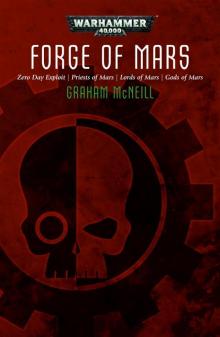 Forge of Mars - Graham McNeill
Forge of Mars - Graham McNeill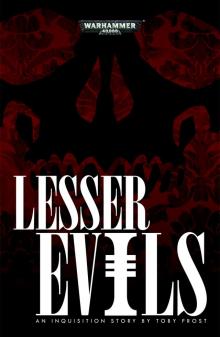 Lesser Evils - Toby Frost
Lesser Evils - Toby Frost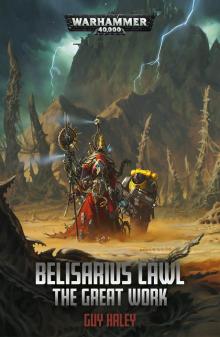 Belisarius Cawl- the Great Work - Guy Haley
Belisarius Cawl- the Great Work - Guy Haley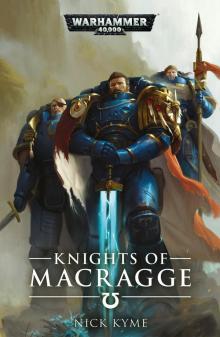 Knights of Macragge - Nick Kyme
Knights of Macragge - Nick Kyme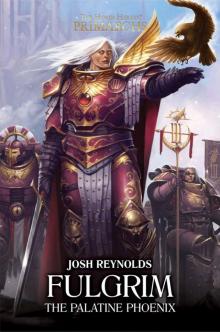 Fulgrim- The Palatine Phoenix - Josh Reynolds
Fulgrim- The Palatine Phoenix - Josh Reynolds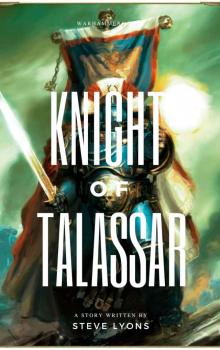 Knight of Talassar - Steve Lyons
Knight of Talassar - Steve Lyons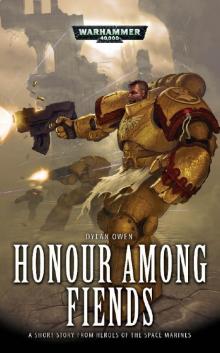 Honour Among Fiends - Dylan Owen
Honour Among Fiends - Dylan Owen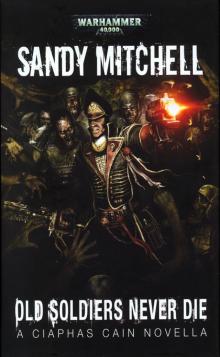 Old Soldiers Never Die - Sandy Mitchell
Old Soldiers Never Die - Sandy Mitchell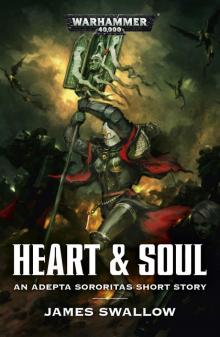 Heart & Soul - James Swallow
Heart & Soul - James Swallow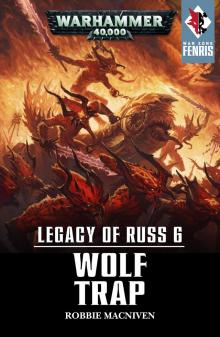 Wolf Trap - Robbie MacNiven
Wolf Trap - Robbie MacNiven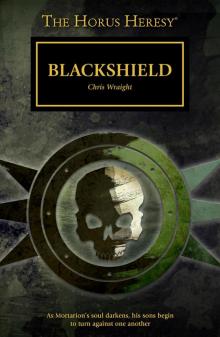 Blackshield - Chris Wraight
Blackshield - Chris Wraight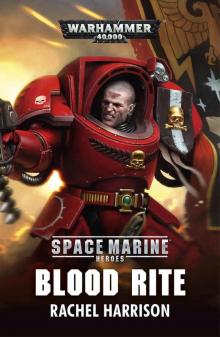 Blood Rite - Rachel Harrison
Blood Rite - Rachel Harrison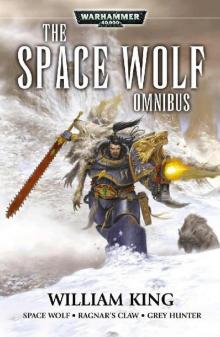 The Space Wolf Omnibus - William King
The Space Wolf Omnibus - William King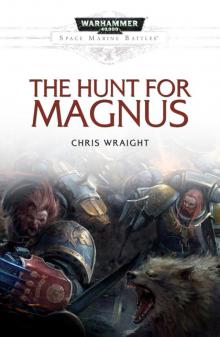 The Hunt for Magnus - Chris Wraight
The Hunt for Magnus - Chris Wraight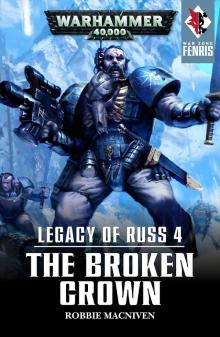 The Broken Crown - Robbie MacNiven
The Broken Crown - Robbie MacNiven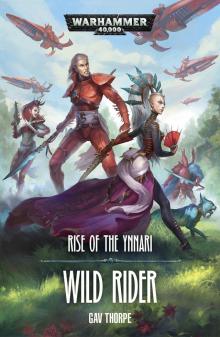 Wild Rider - Gav Thorpe
Wild Rider - Gav Thorpe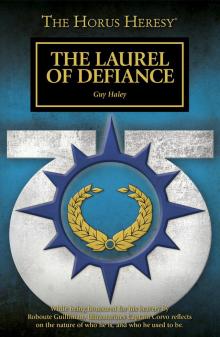 The Laurel of Defiance - Guy Haley
The Laurel of Defiance - Guy Haley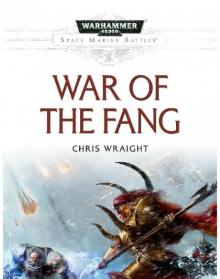 War of the Fang - Chris Wraight
War of the Fang - Chris Wraight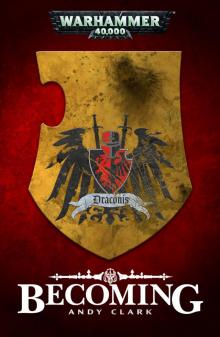 Becoming - Andy Clark
Becoming - Andy Clark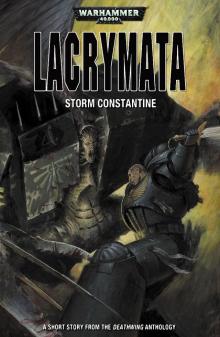 Lacrymata - Storm Constantine
Lacrymata - Storm Constantine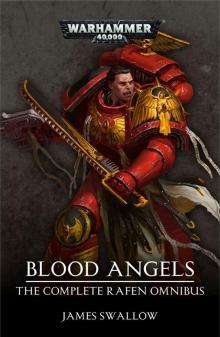 Blood Angels - The Complete Rafen Omnibus - James Swallow
Blood Angels - The Complete Rafen Omnibus - James Swallow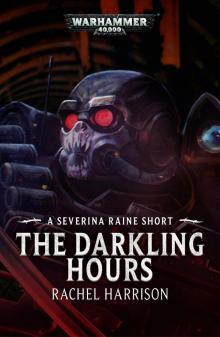 The Darkling Hours - Rachel Harrison
The Darkling Hours - Rachel Harrison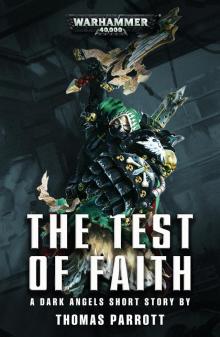 The Test of Faith - Thomas Parrott
The Test of Faith - Thomas Parrott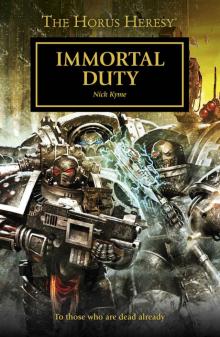 Immortal Duty - Nick Kyme
Immortal Duty - Nick Kyme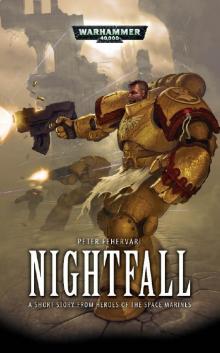 Nightfall - Peter Fehervari
Nightfall - Peter Fehervari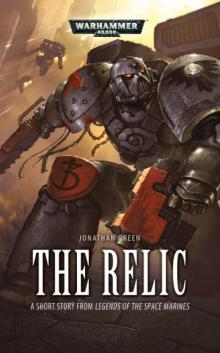 The Relic - Jonathan Green
The Relic - Jonathan Green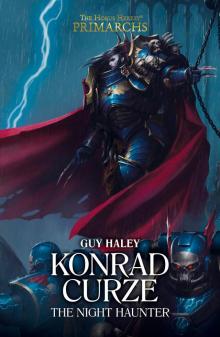 Konrad Curze the Night Haunter - Guy Haley
Konrad Curze the Night Haunter - Guy Haley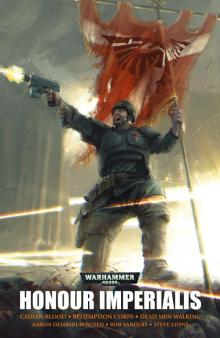 Honour Imperialis - Aaron Dembski-Bowden
Honour Imperialis - Aaron Dembski-Bowden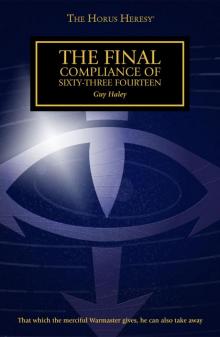 The Final Compliance of Sixty-Three Fourteen - Guy Haley
The Final Compliance of Sixty-Three Fourteen - Guy Haley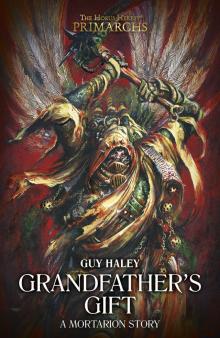 Grandfather’s Gift - Guy Haley
Grandfather’s Gift - Guy Haley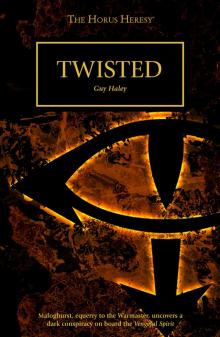 Twisted - Guy Haley
Twisted - Guy Haley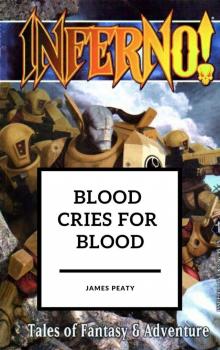 Blood Cries for Blood - James Peaty
Blood Cries for Blood - James Peaty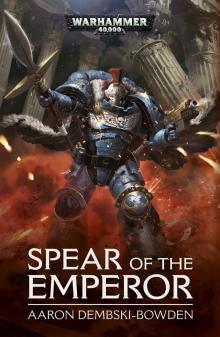 Spear of the Emperor - Aaron Dembski-Bowden
Spear of the Emperor - Aaron Dembski-Bowden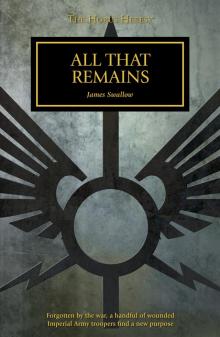 All That Remains - James Swallow
All That Remains - James Swallow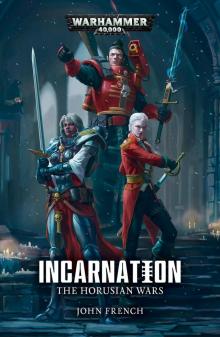 Incarnation - John French
Incarnation - John French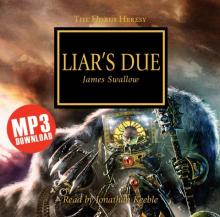 Liar's Due - Ben Swallow
Liar's Due - Ben Swallow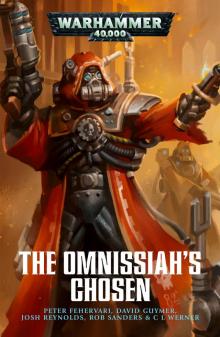 The Omnissiah's Chosen - Peter Fehervari
The Omnissiah's Chosen - Peter Fehervari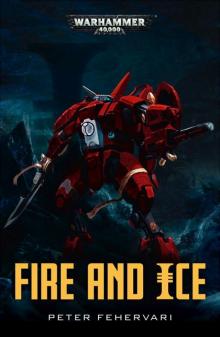 Fire and Ice - Peter Fehervari
Fire and Ice - Peter Fehervari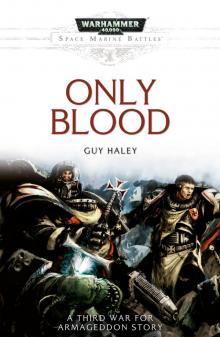 Only Blood - Guy Haley
Only Blood - Guy Haley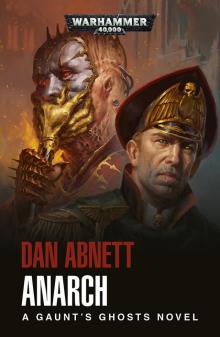 Anarch - Dan Abnett
Anarch - Dan Abnett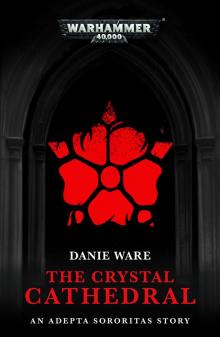 The Crystal Cathedral - Danie Ware
The Crystal Cathedral - Danie Ware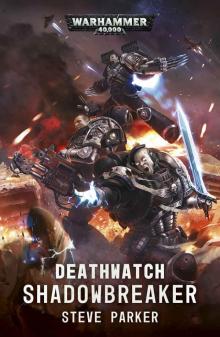 Shadowbreaker
Shadowbreaker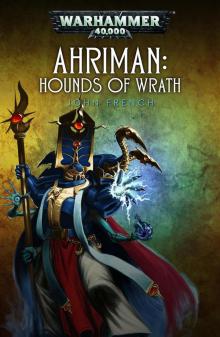 Hounds of Wrath - John French
Hounds of Wrath - John French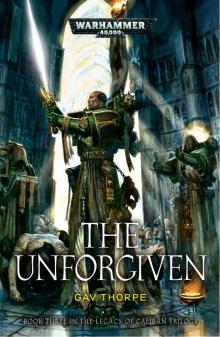 The Unforgiven - Gav Thorpe
The Unforgiven - Gav Thorpe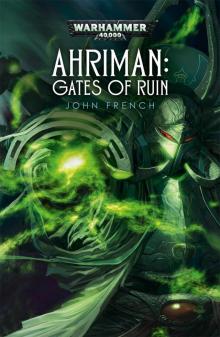 Gates of Ruin - John French
Gates of Ruin - John French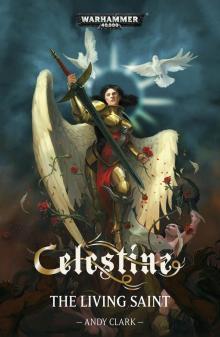 Celestine - Andy Clark
Celestine - Andy Clark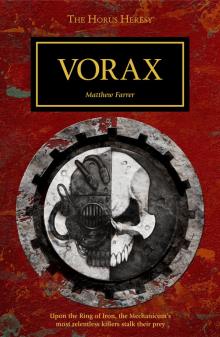 Vorax - Matthew Farrer
Vorax - Matthew Farrer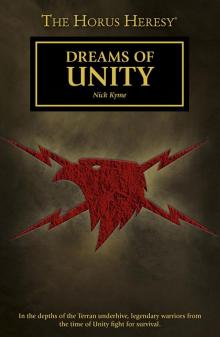 Dreams of Unity - Nick Kyme
Dreams of Unity - Nick Kyme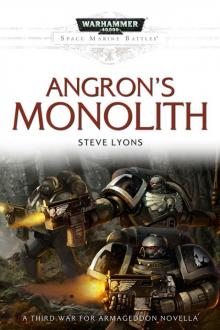 Angron's Monolith - Steve Lyons
Angron's Monolith - Steve Lyons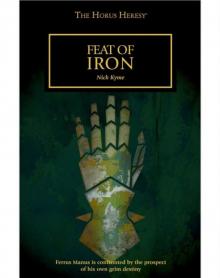 Feat of Iron - Nick Kyme
Feat of Iron - Nick Kyme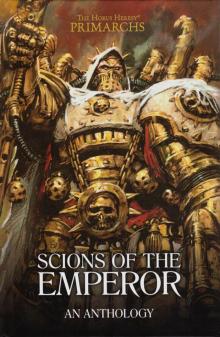 Scions of the Emperor
Scions of the Emperor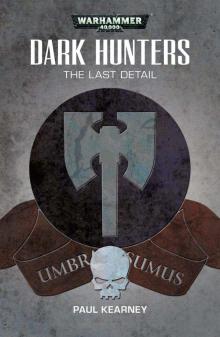 The Last Detail - Paul Kearney
The Last Detail - Paul Kearney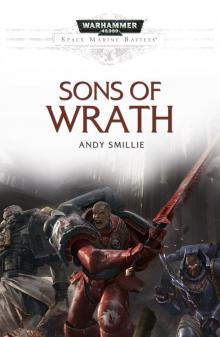 Sons of Wrath - Andy Smillie
Sons of Wrath - Andy Smillie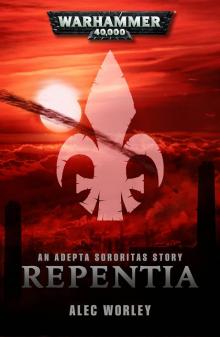 Repentia - Alec Worley
Repentia - Alec Worley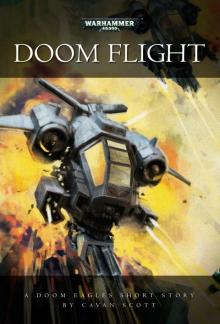 Doom Flight - Cavan Scott
Doom Flight - Cavan Scott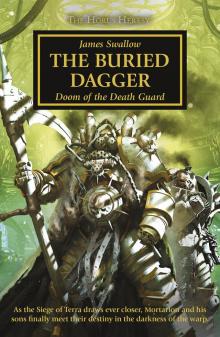 The Buried Dagger - James Swallow
The Buried Dagger - James Swallow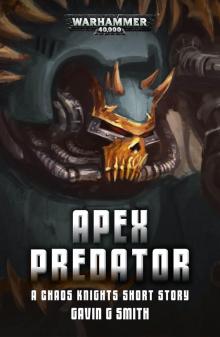 Apex Predator - Gavin G Smith
Apex Predator - Gavin G Smith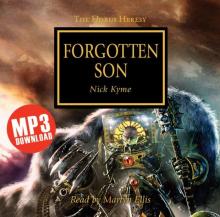 Forgotten Sons - Nick Kyme
Forgotten Sons - Nick Kyme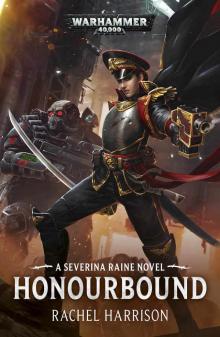 Honourbound - Rachel Harrison
Honourbound - Rachel Harrison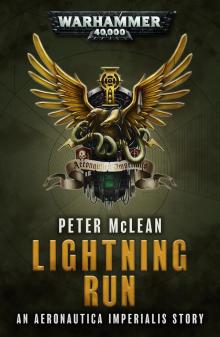 Lightning Run - Peter McLean
Lightning Run - Peter McLean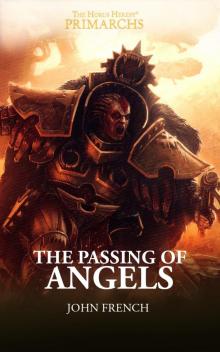 The Passing of Angels - John French
The Passing of Angels - John French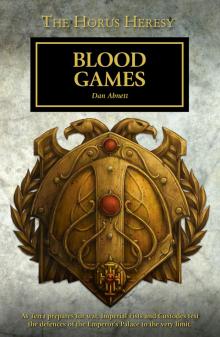 Blood Games - Dan Abnett
Blood Games - Dan Abnett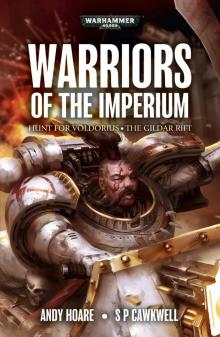 Warriors of the Imperium - Andy Hoare & S P Cawkwell
Warriors of the Imperium - Andy Hoare & S P Cawkwell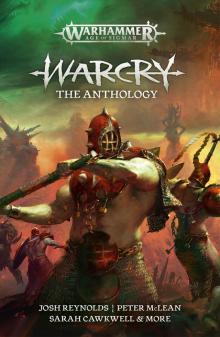 Warcry
Warcry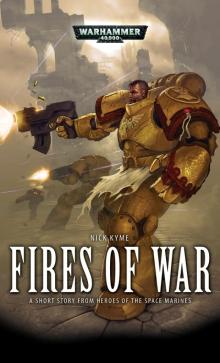 Fires of War - Nick Kyme
Fires of War - Nick Kyme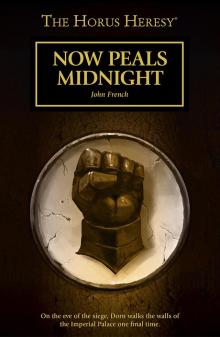 Now Peals Midnight - John French
Now Peals Midnight - John French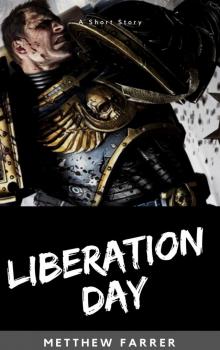 Liberation Day - Matthew Farrer
Liberation Day - Matthew Farrer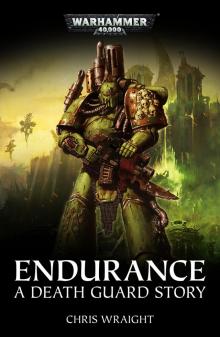 Endurance - Chris Wraight
Endurance - Chris Wraight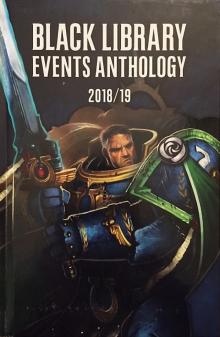 Black Library Events Anthology 2018-19
Black Library Events Anthology 2018-19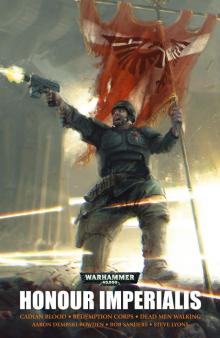 Honour Imperialis - Braden Campbell & Aaron Dembski-Bowden & Chris Dows & Steve Lyons & Rob Sanders
Honour Imperialis - Braden Campbell & Aaron Dembski-Bowden & Chris Dows & Steve Lyons & Rob Sanders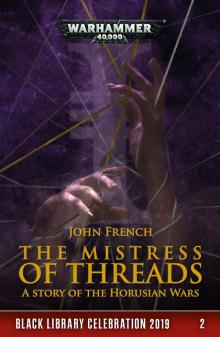 The Mistress of Threads - John French
The Mistress of Threads - John French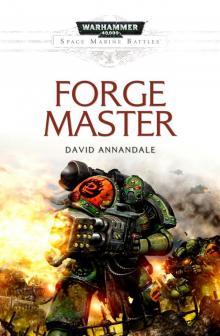 Forge Master - David Annandale
Forge Master - David Annandale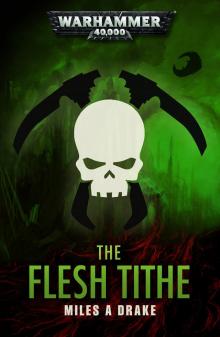 The Flesh Tithe - Miles A Drake
The Flesh Tithe - Miles A Drake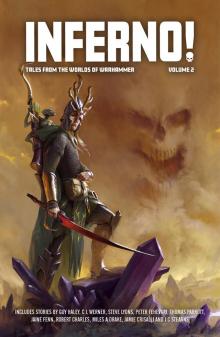 Inferno Volume 2 - Guy Haley
Inferno Volume 2 - Guy Haley Mercy of the Dragon - Nick Kyme
Mercy of the Dragon - Nick Kyme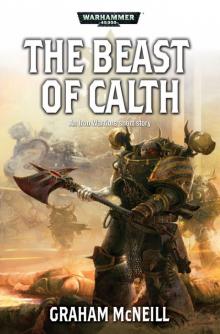 The Beast of Calth - Graham McNeill
The Beast of Calth - Graham McNeill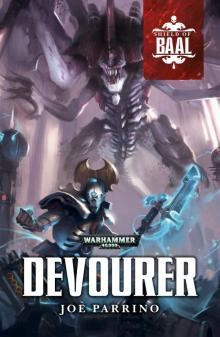 Devourer - Joe Parrino
Devourer - Joe Parrino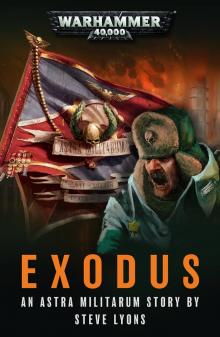 Exodus - Steve Lyons
Exodus - Steve Lyons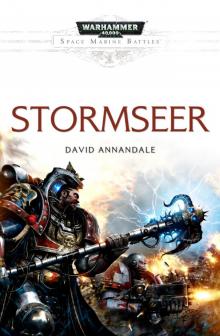 Stormseer - David Annandale
Stormseer - David Annandale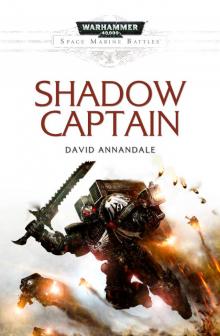 Shadow Captain - David Annandale
Shadow Captain - David Annandale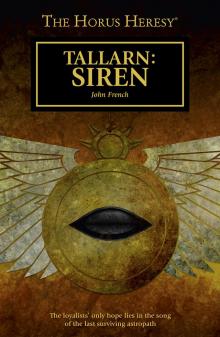 Tallarn- Siren - John French
Tallarn- Siren - John French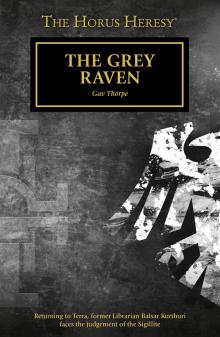 The Grey Raven - Gav Thorpe
The Grey Raven - Gav Thorpe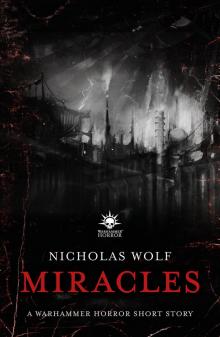 Miracles - Nicholas Wolf
Miracles - Nicholas Wolf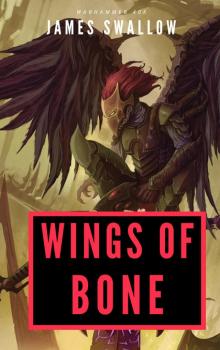 Wings of Bone - James Swallow
Wings of Bone - James Swallow